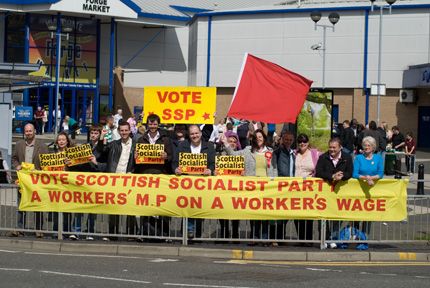Socialist Party (Britain)
Europe: Statement by the Anti-Capitalist Left conference
Mobilisation of the ENOUGH campaign against the IMF in Dublin on July 16, 2011. One of the European actions the European Anti-Capitalist Left pledged to build.
The following statement was adopted by the anti-capitalist left organisations meeting together in London on June 11-12, 2011, on the call of the SWP (Britain) and the NPA (France) as a follow-up to the previous conferences held in Paris in June 2008 [1], December 2009 [2], and May [3] and December [4] 2010. Text from International Viewpoint.
Britain: Building left unity out of the wreckage

The Socialist Resistance national committee adopted this document, by Liam Mac Uaid, on January 9, 2010, to outline its balance sheet of the last decade’s attempts at the resolving the crisis of working-class representation in Britain.
* * *
January 9, 2010 -- Socialist Resistance -- The workers’ movement in Britain has faced a crisis of working-class representation since the rise of New Labour in the mid-1990s and it has been becoming more acute ever since. This backdrop put left unity at the centre of the political agenda. The rise of the Scottish Socialist Party (SSP) and the Socialist Alliance (SA) were the first organisational expressions of this necessary process. A critical look at the last decade is essential if we are not to make the same mistakes – those who do not learn from history are pretty likely to make the same ones all over again.
Anti-capitalist European Left: capitalists not workers must pay for the crisis
May 6, 2009 – British left groupings Socialist Resistance and the International Socialist Group have joined the Socialist Party, Socialist Workers Party, Scottish Socialist Party and others of the European anti-capitalist left in endor
Scottish Socialist Party: ‘Little Britain’ politics and the left

By Alan McCombes
April 24, 2009 -- Voters who want an isolationist Britain will be spoiled for choice in the European elections on June 4th. On the far right, the BNP and UKIP both demand an independent Britain. Left of centre parties that want British withdrawal include Arthur Scargill’s Socialist Labour Parry and the NO2EU Yes To Democracy coalition. While these four parties promote British independence, the Free Scotland Party campaigns for an independent Scotland outside the European Union.
What should be the attitude of Scottish socialists towards Europe? Should the left back British separatism? And does the NO2EU Yes To Democracy campaign represent a progressive step forward?

Below are a range of views from the British and Scottish left on the strike wave that erupted at the Lindsey oil refinery and rapidly spread across the country. Statements from Socialist Resistance, Scottish Socialist Party, Socialist Workers Party, Respect MP George Galloway, the Socialist Party, the Morning Star, Lenin's Tomb blog and the Socialist Unity blog.
* * *
For international solidarity between workers
Socialist Resistance statement
Broad parties and narrow visions: the SWP and Respect
By Murray Smith
January 4, 2008 -- The crisis which has led to a split in Respect is an important development, affecting as it does the principal force of the radical left in England. The future will tell us whether the current crisis represents just another failure, another dead-end, another missed opportunity for the English left, or whether, as seems increasingly possible, it offers Respect itself the chance for a renewal and is perhaps a step on the road towards a broader formation.
Whichever way you look at it, the Socialist Workers’ Party (SWP) is at the centre of the crisis. It is or was the central component of Respect, as it had been of the Socialist Alliance which preceded it, and it has been one of the main protagonists in the conflict that has engulfed Respect. So I want to look at what has happened from the point of view of the relationship between the SWP, a traditional far-left organisation, and the broader left formation that Respect is. I think there are some lessons to be learned which go beyond Britain.
Phil Hearse came into politics through the Campaign for Nuclear Disarmament and subsequently joined the Young Communist League in 1962 at the age of 13. He was expelled in 1963 for being a member of a "Trotskyist-led faction". From 1967, he was for 27 years a member of the British section of the Fourth International, before joining Militant Labour in 1994. After three years he left with a small group to help found Socialist Democracy.



